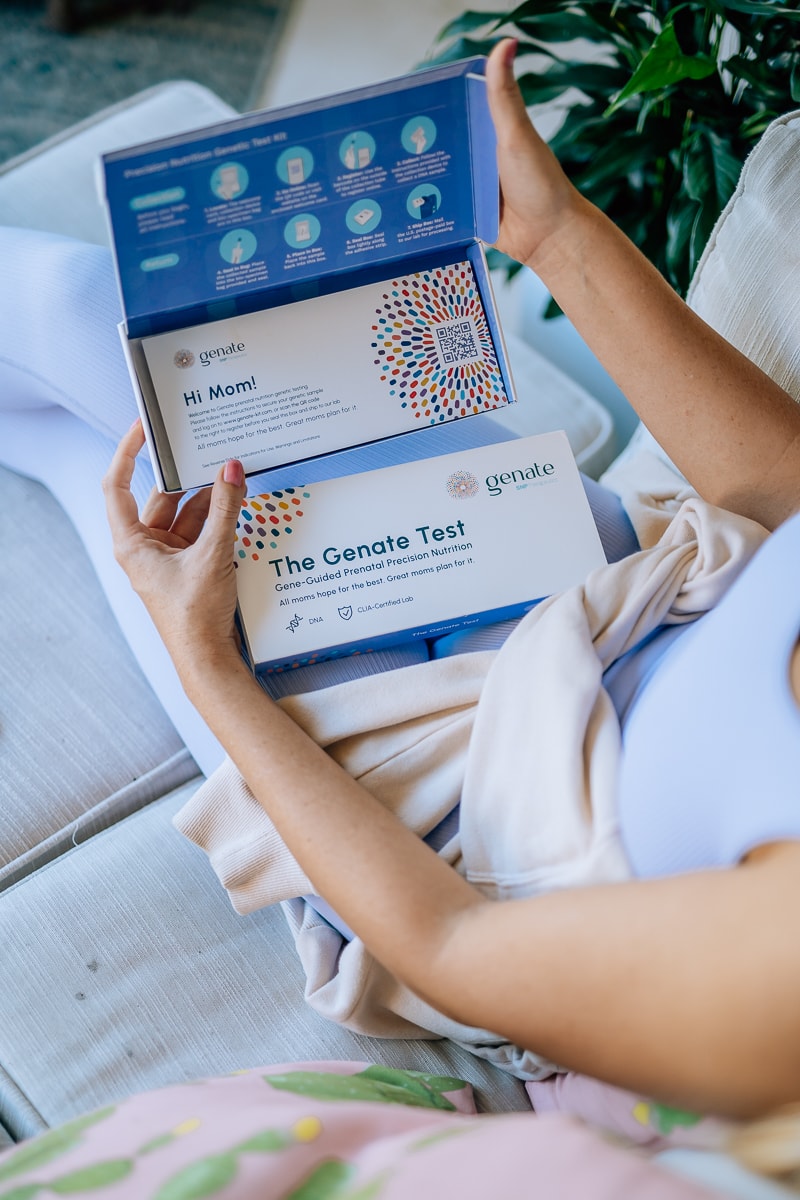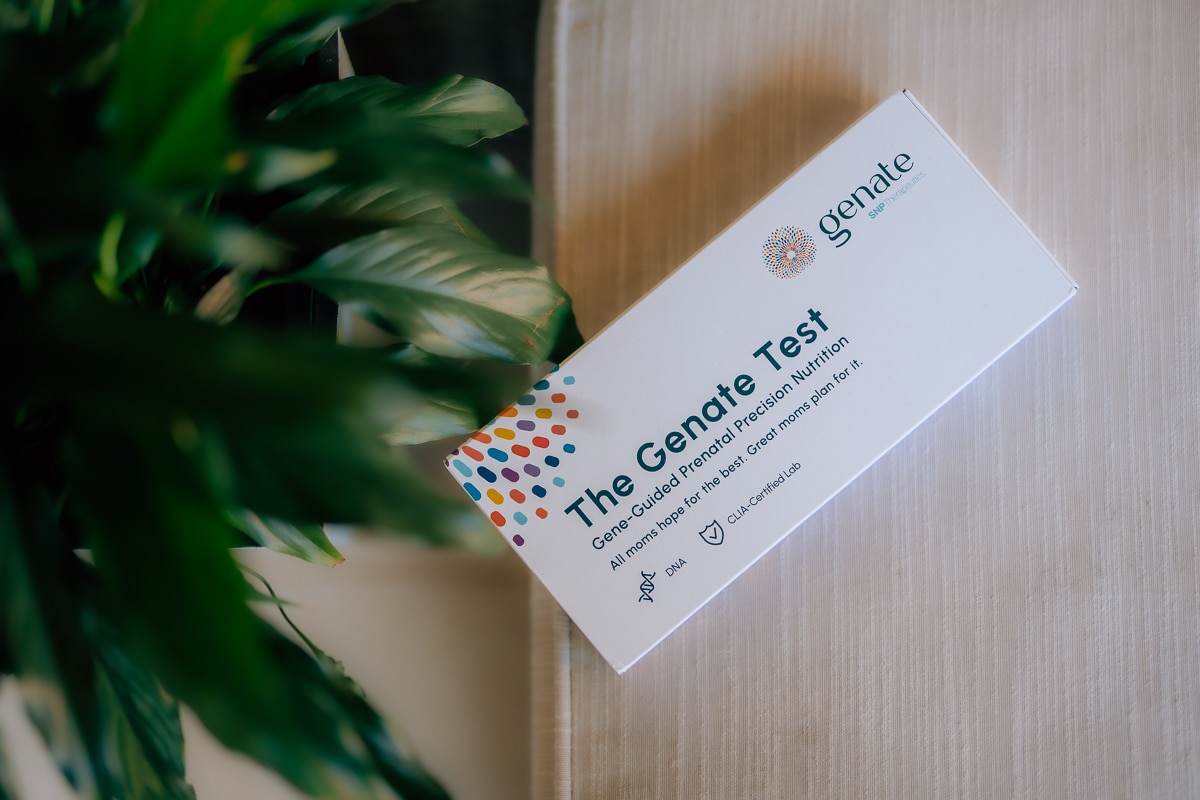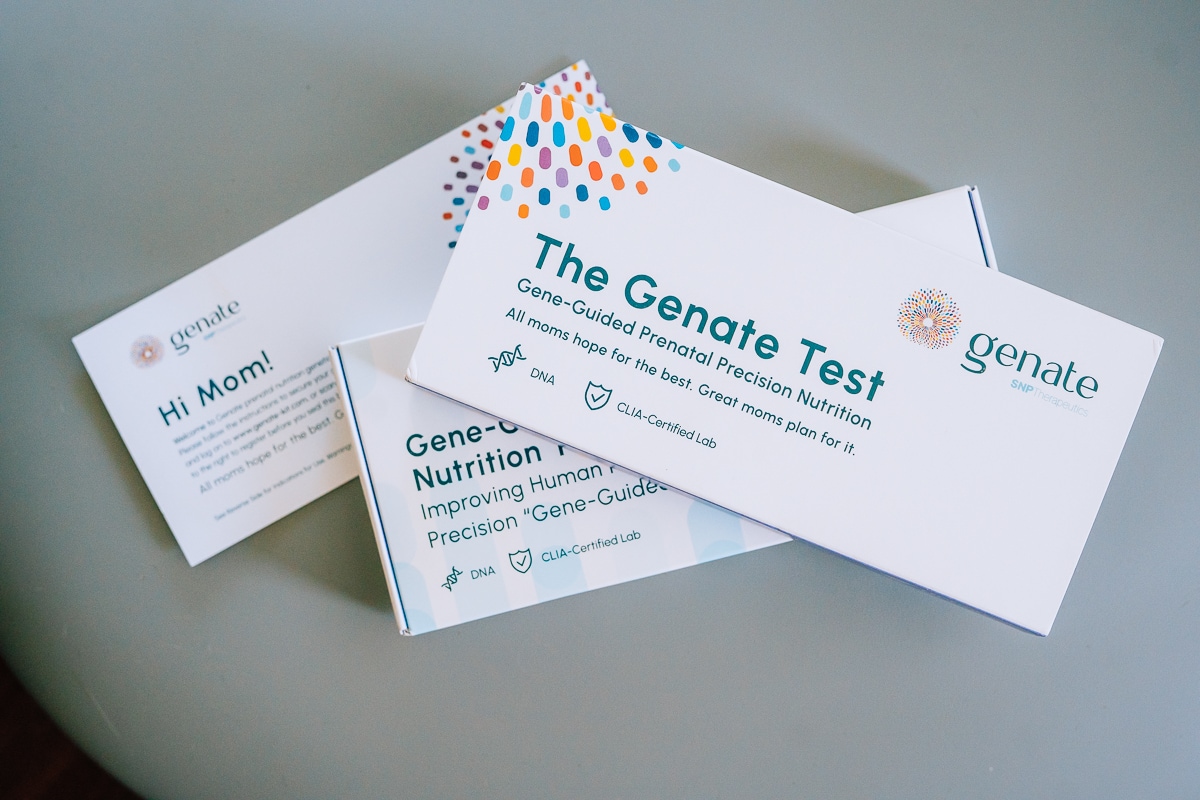Before I was even pregnant with my first child 13 years ago, I was researching as much as I could about prenatal environments and nutrition to make sure I was fully prepared when it was time to conceive. I knew enough to be aware of the tremendous impact that prenatal behavior had on a developing fetus.
I did my best with the information that was available to me at the time and went to great lengths to make sure that my nutrition before and during pregnancy was ideal for the development of my daughter. But one thing I did not account for, nor had any information about, was the genetic impact of my nutritional status on how I metabolize nutrients and thus its influence on my baby’s health.
13 years later, we have seen many advances in prenatal care and knowledge, and one of those advances I wish I had access to is a genetic test that determines your nutritional deficiencies that have the potential to impact what your unborn baby needs. As an expectant mother, the Genate Test would have been an absolute game changer for me, someone who was hungry for prenatal knowledge.


Fast forward to now: I have an incredibly healthy and smart 12-year-old (thanks to all that knowledge and research I did have access to) and no more babies in sight, yet I was so curious about what a genetic test would tell me about my body and how it handles certain vitamins and minerals, so I decided to take one with the sole purpose of helping educate others on possibilities of genetic nutrient deficiencies that can impact pregnancy.
I figured it would be helpful for my life, regardless of whether I am pregnant or not and it would further my knowledge about prenatal care and nutrition, as well as help other moms searching for this information.
For background, I am a healthy 39 year old, with no symptoms or health issues, leading a healthy lifestyle and on a whole foods diet. The expectation from this test was that it was going to come back telling me, once again like every other genetic and blood test I have taken in the past, that there is nothing special to talk about and everything is fine, which would render this article somewhat useless.
So I was EXCITED to get the results and see that there WERE genetic deficiencies at play that I could discuss and write about. Even though there’s no baby expected, this information would still help me lead my healthiest life possible.


But let’s go back to the testing part. The test itself was incredibly fast and easy. Genate sent me a box with a cotton swab, a stabilizing liquid, and a return label. I swabbed my mouth, put the cotton end into a container with the liquid, and sealed everything. Then I used the prepaid label to package it all back into the box it came in and mailed it off. To make sure Genate can connect my sample to me, I had to create an account and add the unique test number.
The entire process was incredibly detailed and personalized, making it more than just a service – it was an experience.
The concept behind Genate Test is refreshingly unique – it’s not about a one-size-fits-all approach to prenatal vitamins and nutrition, but rather about understanding your body’s unique needs based on your genetic blueprint.


After about 2 weeks I got a notification that my results were ready. Let me preface this with the fact that I already have a little bit of knowledge in epigenetics, and genetics and a lot of knowledge in nutrition. Yet I was completely overwhelmed with the amount of technical information presented. There is so much you can learn from a Genate report that will not only help your growing baby but will change how you eat in the long run.
The Genate Report was fascinating to read. I learned things about my body that I never knew before, including how my unique genetic makeup affects how I metabolize nutrients. It was insightful to learn how our diet could directly influence a baby’s cognitive development beyond the usual recommendations, as well as our own health and well-being.


I gained so much knowledge about prenatal vitamins, the differences between them, and how our bodies metabolize them differently. I was previously unaware that certain genetic challenges could make it difficult to efficiently metabolize certain nutrients, even with a balanced diet.
The Genate Test also provided a deeper understanding of how various nutrients such as DHA, Choline, Folate, B12, B6, Vitamin A, C, D, K, magnesium, calcium, and Iron affect our body and their levels of absorption and efficiency are dependent on our genetics.


Without the Genate Test, I would have continued with my regular diet, oblivious to whether it was meeting my future baby’s cognitive development needs. This test has enlightened me on the importance of prenatal nutrition and how it should be based on my genetic signature.
I highly recommend the Genate Test to every expectant mother who wants to ensure that their prenatal nutrition is optimized for their baby’s development. It is an investment in the health and well-being of both mother and child, and it’s worth every penny.
What is Genate Prenatal Nutrition Testing by SNP Therapeutics?
We all know that healthy eating during pregnancy is extremely important. Most women know to make sure to take folic acid to prevent neural tube defects even in pre-pregnancy, when still trying to conceive. Good nutrition helps your body deliver the nutrients to your baby, so you want to make sure you’re getting enough B vitamins, eating whole plant-based foods, and taking a prenatal vitamin, especially during your second and third trimester.
The Genate Test is a DNA testing service offered by Genate, a leading company in the field of genetics and genomics.

This test is designed to provide a comprehensive analysis of an individual’s DNA to give insights into various aspects of how nutrients are absorbed, metabolized, and carried by each person and how that impacts fetal development. The test involves the collection of a DNA sample which is then sent to a laboratory for examination. The results of the test are provided in a very detailed report that also offers recommendations for diet changes and combined with a video call with a nutritionist creates a complete picture of what your body needs that you would never know without this test.
It is important to note that while the Genate Test can provide valuable insights, it is not a substitute for traditional medical advice and should be used in conjunction with regular health check-ups.
Why do I want to test my genetics for a healthy pregnancy and breastfeeding
- To understand your genetic makeup and potential health risks: Testing your genetics can provide insights into your DNA and any potential health risks you or your baby might face due to inherited genetic inefficiencies that prevent nutrients from effectively getting absorbed.
- To make informed decisions: Knowing your genetic makeup can help you and your partner make informed decisions about nutrition during pregnancy.
- To reduce anxiety: Genetic testing provides concrete information that can reduce anxiety and uncertainty related to your baby’s health. The test helps prevent fetal abnormalities due to maternal nutrition.
- To access personalized prenatal and maternal care: If a genetic inefficiency is detected, your dietician can personalize your prenatal nutrition care to manage the disorder most effectively.

When do you use Genate Test?
- You can take the Genate test at any time.
- It doesn’t require any special conditions such as fasting.
- It is simple and can be done in the comfort of your own home.
- After you order the test kit online, it is delivered to your home where you take a simple saliva sample.
- Once the sample is collected, you send it back in the prepaid return bag.
- You don’t need to visit any clinic or medical facility to take this test.
From the Genate website: “The best time to take The Genate Test is before you are planning to get pregnant, 3-6 months prior to conception, and before you have started taking a prenatal vitamin. Having said that, The Genate Test can be taken anytime you want to understand how your genes affect the metabolism of key nutrients important for your baby’s development. This could be in any trimester of pregnancy or even while breastfeeding.”

What does the Genate DNA Nutrition test tell you?
Genate Prenatal Nutrition Test examines inefficiencies in your genes, and how can they impact the pathways and metabolization, and accessibility of certain nutrients so that, informed with these facts, you can adapt your daily nutrition and supplement intake. It helps reduce the risk of neural tube effects or other fetal abnormalities caused by nutrient insufficiency.
In my case, I was very surprised to see that my body needs almost 3 times the amount of Choline because the genes responsible for those pathways had significant inefficiencies that kept my body from metabolizing these nutrients effectively.
Those inefficiencies meant that I have significant difficulty converting nutrition from my dietary intake of Choline into nutrients needed for my body and my baby.


Does Genate tell which foods to avoid?
The goal of prenatal genetic testing by Genate is to find inefficiencies in your genetic pathways that prevent absorption and metabolization of nutrients, so the focus is on which foods and supplements you should increase to offset the potential insufficient intake of vitamins and nutrients needed for healthy baby development.
The results include personalized nutrition recommendations on eating well, specifically for your genetic makeup to avoid serious birth defects, to encourage the baby’s growth and development, and make sure that you and the baby get the essential nutrients necessary to stay healthy throughout the pregnancy and beyond.


How long do the Genate results take?
Results take about 2 weeks and are delivered in an online portal in 9 different sections:
- Topline results
- Metabolic Pathway Roadblocks
- Gene Variants and Nutrient Table
- My Unique Needs
- Does My Diet Support My Needs?
- Supplements
- One Carbon Nutrients and Cognitive Development
- Dietary Sources of One Carbon Nutrients
- Pregnancy Nutrition 101

Can I share the nutrient results with my doctor?
Yes, you are very welcome to talk to your doctor about your prenatal genetic results to help him have a more holistic view of your pregnancy and help reduce the risk of neural tube defects.
Maternal Nutrition Counseling and Pregnancy Meal Plan
When you order your Genate test you have an option to choose Maternal Nutrition Counseling along with it, which breaks down the results into a more digestible form and helps you figure out the best supplements for you and your growing baby. Maternal Nutrition counseling can also be ordered after the fact if you have trouble deciphering the test results on your own.
Genate’s registered dietitians will conduct a comprehensive nutrition assessment, taking into account your medical history, nutrition needs, health goals, and personal preferences, and then create recommendations on the best foods based on all the information provided by you and the test.
Using this information, you can create a perfect pregnancy meal plan that aligns with your genetic findings and helps create a perfect environment for the baby.


Important Nutrients in Prenatal Vitamins for a Healthy Diet
Once you go through the results, you can order personalized Genate Supplements designed with the most bioavailable nutrients in the correct amounts for you and your baby. If your test indicates a higher need for certain nutrients, you can add additional single nutrient supplements to add to your regimen.
My overall experience with Genate
I was very impressed with the depth of information that Genate prenatal nutrition testing gives, as well as the ease of the process and how little we know about our bodies without taking genes into account. I blissfully lived 39 years without any idea that I could barely process Choline. I am also very thankful that I went crazy with DHA foods and supplements during my pregnancy naturally, without even knowing that I have moderate inefficiencies in processing DHA.

Even without being pregnant, this test helped me change my nutrition and explain some past blood test results. Since genes are inherited, I know to also slightly change my daughter’s diet and put more focus on the one-carb nutrients that I have difficulty processing and she might too.
I can say that it’s one of the most important tests someone who is hoping to get pregnant can take ahead of time or during pregnancy to ensure the optimal nutrition and health of their baby.
SHOP:
Genate Test
EXPLORE AND CONNECT:
Genate | Instagram
CONNECT WITH DAILY MOM
💖 NEWSLETTER: DAILY READS IN YOUR INBOX 💖
Sign up to receive our picks for the best things to do, see and buy so you can relax and focus on more important tasks! Let us help you be the best version of yourself you can be!
BE SOCIAL WITH US
📌 LOVE IT? PIN IT!📌











































